Mediterraneum / Ensemble Oni Wytars
Ancient Worlds of Improvisation Between Orient and Occident
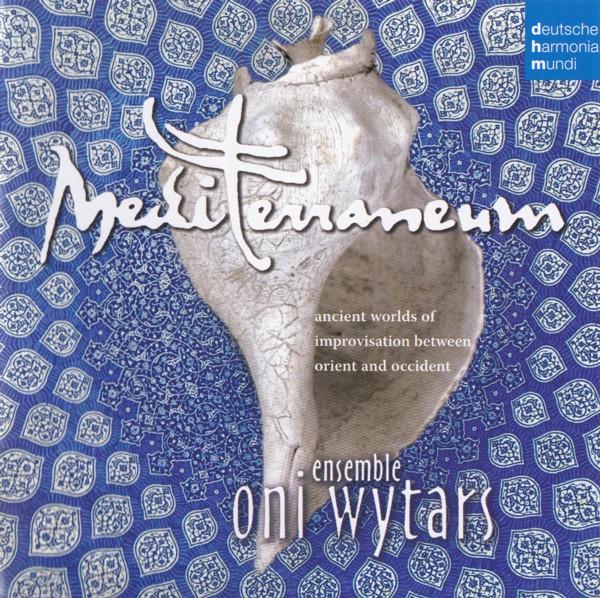
medieval.org
oniwytars.de
worldcat.org
Deutsche Harmonia Mundi 88697633802
2010
1. Tre fontane [4:48]
Anonymous, Italy, 14th c.
2. Oi Yano, Yano [2:05]
Traditional Trace
3. Jalla mân [6:21]
Traditional Arab, 'Andalusian School'
4. Firassu in si b [2:54]
Luigi Lai
5. Quannu passu [1:07]
Traditional Sicily, Corpus Favara 441
6. Son tre corone [1:33]
Anonymous, Italy, Toscana
7. Saltarello [5:21]
Anonymous, Italy, 14th c.
8. [5:10]
Laudemus Virginem Llibre Vermell de Montserrat, 14th c., Spain
LV 3
Bektashi Nefes Kul Nesimi (?), 17th, Ottoman Empire
9. Stella splendens [8:18]
Llibre Vermell de Montserrat, 14th c., Spain
LV 2
10. Isabella [3:24]
Anonymous, Italy, 14th c.
11. Osman Paşa [9:10]
Traditional Ottoman
12. Mey Balaban taksim [1:42]
Anonymous
13. Mevlana [10:34]
Traditional Sufi Hymn
14. Nani, nani, nani [8:37]
Sephardic lullaby, Turkey/Greece
15. Non sofre Santa Maria [3:53]
Alfonso X 'El Sabio', 13th c., Spain
CSM 159
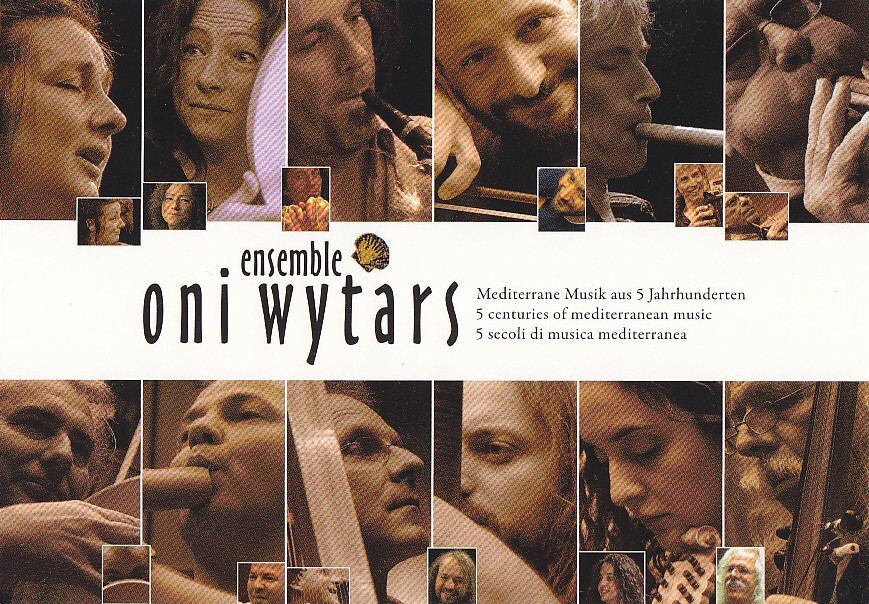
Ensemble Oni Wytars
Marco Ambrosini — viola d'amore a chiavi (nyckelharpa), pochette d'amore
Katharina Dustmann — zarb, bendir, davul
Peter Rabanser — oud, djura gaida, chalumeau, castagnettes, balaban, claps, cunchas/shells, voice
Riccardo Delfino — harp, claps
Michael Posch — recorders, bamboo flute, voice
Belinda Sykes — mey (duduk), voice
Efrén López — oud, citola
Ian Harrison — cornetts, shawm, gaita, voice
Carlo Rizzo — tamburellos, riqq, bendir, voice
Ross Daly — Cretan lyra, tarhu
Kelly Thoma — lyra
Luigi Lai — launeddas
Arrangements by Oni Wytars,
except Tr. 2: Belinda Sykes, Tr. 4: Luigi Lai, Tr. 6: Carlo Rizzo, Tr. 15: Ian Harrison
Recorded: Kammermusiksaal, Cologne, October 1-3, 2009.
SONY MUSIC
℗ & © 2010 Deutschlandradio, Sony Music Entertainment
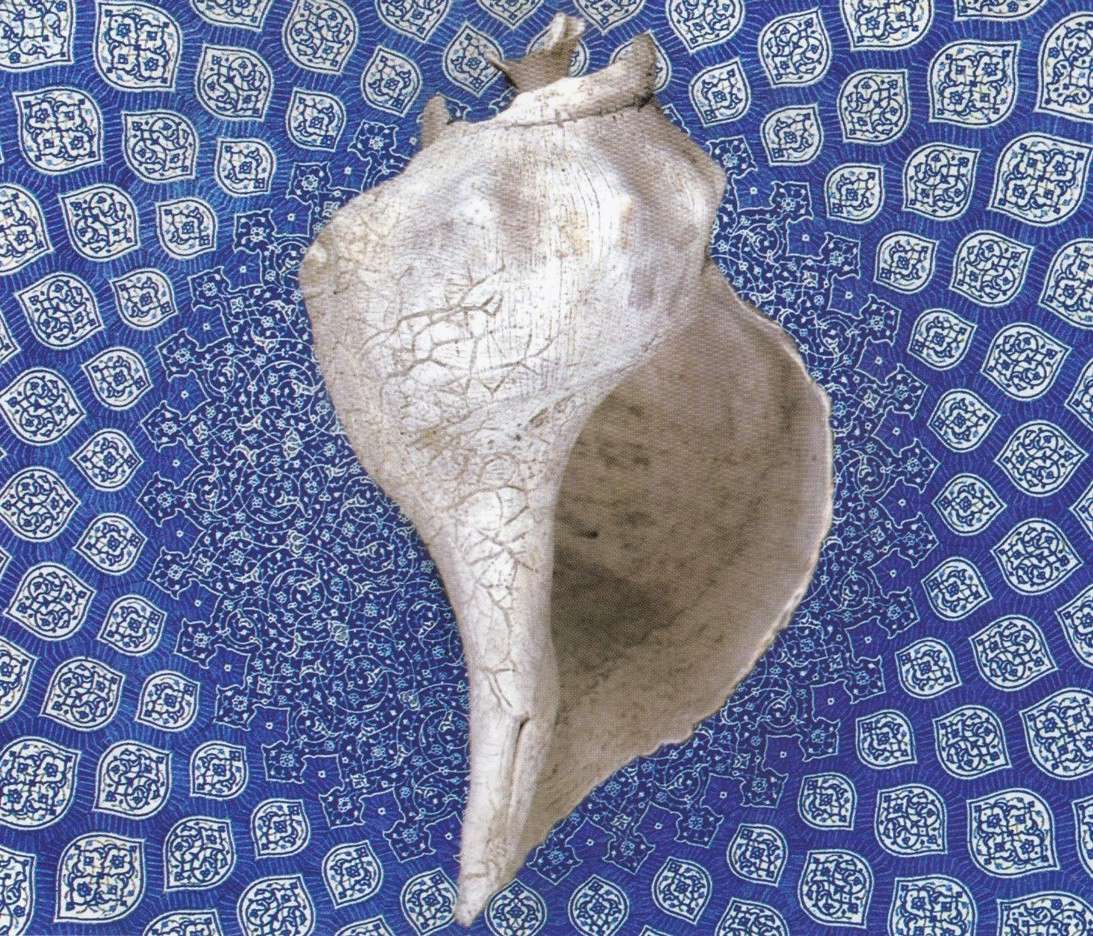
Mediterraneum
A
swimmer glides through the waves of the Mediterranean Sea, tirelessly,
harmoniously, rhythmically, a marine meditation which takes him from
East to West, from Greece to Spain.
But unlike Odysseus or
Orpheus he doesn't have to suffer the songs of the Sirens, which almost
drove them mad, but he can hear and enjoy the music of those countries
whose coasts he passes. With eager ears he takes in those fascinating
sounds which blend in his mind to a cosmos of sound.
Here is the
international Ensemble Oni Wytars' dream journey, a programmatical idea
realised with the help of some very special guests and directed by the
Italian-born 'homo mediterraneus' Marco Ambrosini. It is a journey
through time, countries, religions and traditions, showing that the
musics of the Mediterranean, in all their variety, possess a common
basis.
The recognition of this was the basis for this project.
Love of the subject matter and the joy of improvisation on this 'ground'
have been foremost in the minds of the players, who come from many
musical backgrounds whether Arabic-Persian, 'new, 'early', or
'classical' traditional. The unique, unmistakeable sound of Oni Wytars
arises from the harmony of musical instruments from many traditions — a
timeless music. The emphasis is not on 'authenticity' or historically
correct, dogmatic performance practice, but on the common ground between
the musics of many periods. The pieces on this recording have been
assembled from many different sources and from many centuries, justified
only by their quality, and played here with the background of 25 years
of experience.
This recording leads the listener, even if he or
she has little experience of this sometimes strange-sounding music, into
an exotic sound world, leaving him or her feeling a comforting
melancholy with can easily become a habit.
Dr. Christiane Lehnigk
ensemble oni wytars
Mediterraneum
"Ten thousand rivers flow into the sea, but it never overflows ..."
The
floods of the Nile and the Tiber, the spring water from the Caucasus,
the Balkans, the Pyrenees, the Alps and the Atlas mountains mingle in
the Mediterranean. The Romans called it "Mare Nostrum" — "our sea" — and
yet it belongs to everyone.
Mediterraneum mare nostrum,
sicut Caelum caeruleum,
latum sicut Caelum,
sicut Caelurn profundum,
sicut Caelum purum,
pater et mater nostri maris populorum ...
(Daniela Vespignani)
For
previous generations the Mediterranean Sea really was the 'middle of
the world: The trade routes between North and South, Occident and Orient
crossed here. Civilisations, religions and the three 'old' continents,
Africa, Asia and Europe met here. The three monotheistic religions vied
with each other here; the great Egyptian, Greek and Roman Empires rose
and fell here. Peoples, languages and traditions met, wars were fought,
and lands were reconciled through trade and the exchange of thoughts and
ideas. The Mediterranean as the cradle of cultures...
We founded
Oni Wytars in 1983 as an ensemble for medieval music, but our work with
the sounds of the Italian Trecento, the pilgrim songs from Catalan and
Spanish manuscripts of the 14th Century, and the melodies of the
troubadours and trouvères soon raised some vital questions. Most of this
repertory has survived monophonically. But from literary and visual
sources we know that instrumental performance was usually colourful and
varied, and perhaps even "orchestrated". King Alfonso X (1221-1284)
maintained a court orchestra consisting of musicians from all three
religions then coexisting in Spain. Today's performer of medieval music
is therefore required to use his or her imagination to bring these
melodies to life.
Our next step was to study living musical
traditions from the Mediterranean area. Tarantella rhythms from Sicily,
bagpipe tunes from Eastern Europe or Spain, Greek lyre sounds or
Turkish-Arabic improvisations on the oriental lute, the ud,
immerse us in a Mediterranean sound cosmos. Although many of these
traditions go back centuries we cannot call them "authentic medieval".
But a "historically correct" performance is impossible for the music of
the 13th or 14th centuries — the sources are too few and far between and
the temporal distance too great.
Oni Wytars deliberately follows
its own path, building sonic bridges to worlds distant in time and
space. The music of the Byzantine era meets Balkan melodies of the
present; Spanish Cantigas of the 14th Century are contrasted with
ballads of the Sephardic Jews; Arabo-Andalusian sounds segue into
oriental tunes of today.
Many of the instruments played here are
of Turkish-Persian or Arabic origin. Middle-Eastern drums and shawms
have been known in the West since the first Crusades. During the nearly
eight centuries of Moorish-Islamic rule in the Iberian peninsula, there
was a lively cultural exchange between Eastern and Christian musicians.
The beautiful miniatures of the Cantigas de Santa Maria from the
13th Century bear witness to this, with their detailed images of Arab
and Western instruments such as flutes, bagpipes and lutes.
A number of European instruments owe their names to Arabic: the Oriental lute, al ud, became lahut in Latin, then liuto in Italian and Laute in German. The lyra, played today in traditional music in Calabria and Greece, comes from the rebab,
a bowed lute, probably the first known European bowed instrument. We
North Europeans can thank these peoples for the invention of the bow,
which was completely unknown in our latitudes until the 9th Century.
Many other instruments came to the Mediterranean area from the east: the
harp; the aulos, a native of Egypt, a version of which is still played today in Sardinia where it is known as launeddas; the castanets, known to the Assyrians; the davul or big drum, and various forms of frame drums such as the bendir, tamburello and riq.
Ensemble Oni Wytars, Tom Daun
English translation: Ian Harrison
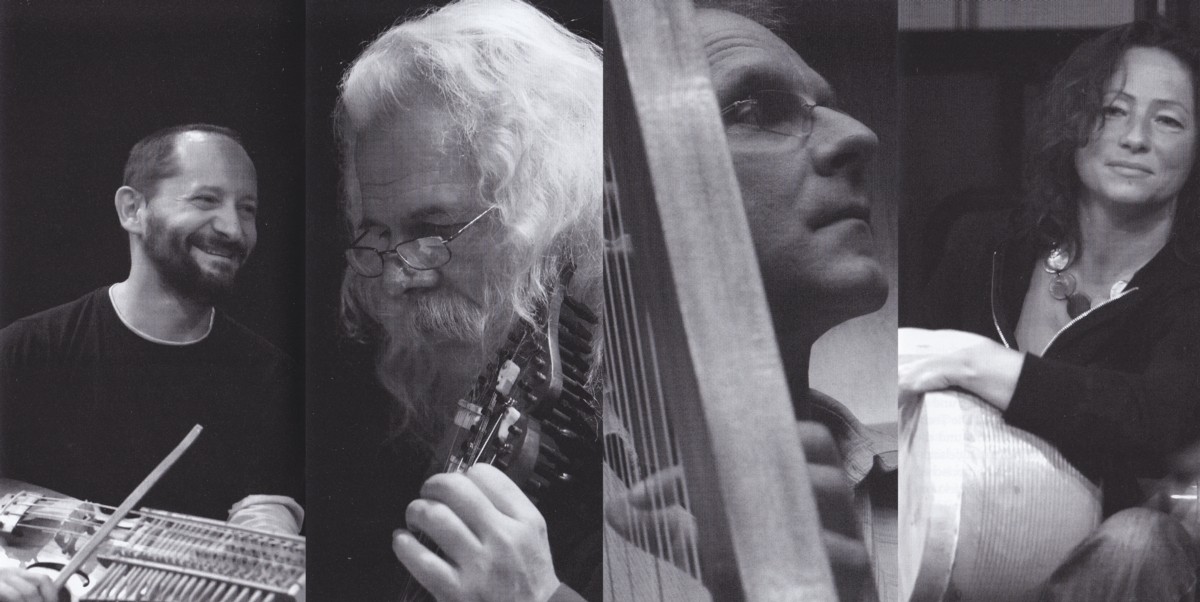
Marco Ambrosini
Marco
Ambrosini from Forli, Italy, studied violin and composition in Ancona
and Pesaro. In 1983 he founded, together with Peter Rabanser, the
ensemble Oni Wytars. Since 1991 he has performed as a soloist and
composer in various early and contemporary music ensembles. He works
with jazz musicians such as Valentin Clastrier, Jean-Louis Matinier and
Michael Riessler. He was declared the "Jazz-Newcomer 1993" by German SWR
Radio.
Ross Daly
Born
in England of Irish descent, as a child he travelled with his family
round the world. In San Francisco he discoverd Eastern musical
traditions, which changed his life. In 1975 he moved to Crete, where he
learned to play the lyre. He has visited Turkey several times to study
Ottoman classical music and Turkish folk music. His ensemble "Labyrinth"
is one outcome of his musical workshops in his adopted home Crete.
Riccardo Delfino
Born
in Krefeld (Germany) he studied piano and cello and then started
intensive research into European folk music. Since 1982 he has been
working with Early Music ensembles. He studied hurdy-gurdy with Valentin
Clastrier und Evelyn Girardon, and French bagpipes with Jean Blanchard.
In 1990 he gained the University Certificate in Music for drone music
at the Conservatory of Gothenburg.
Katharina Dustmann
Born
in Bad Oeynhausen (Germany), she took lessons on historical woodwind
instruments and then specialised in Oriental percussion. She studied
classical Persian percussion (zarb) with Naser Mehraver in Cologne and
completed a masterclass at the Bayerische Musikakademie with Glen Velez
(USA) in frame drums. Katharina works as a composer and arranger in
musical and music theatre productions throughout Europe.

Ian Harrison
Ian
Harrison grew up in Newcastle upon Tyne, England. He studied cornett at
the Royal Conservatory of The Hague and the Schola Cantorum
Basiliensis. Combining the virtuoso technique of this instrument with
the traditional articulation of the bagpipe he has become one of the
first modern masters of the shawm. He is one of the world's most active
performers and teachers of these early wind instruments, playing
regularly in concerts, on recordings and radio throughout Europe and
beyond.
Efrén López
Born
in Valencia, he learned to play the trumpet as a child and then
discovered his passion for the guitar. His interest in traditional
plucked instruments led him to Colombia and Puerto Rico. In 1993 he
began to study the sitar and also turned to the traditional music of his
Spanish homeland. He collaborates increasingly with musicians in the
fields of folk and early music.
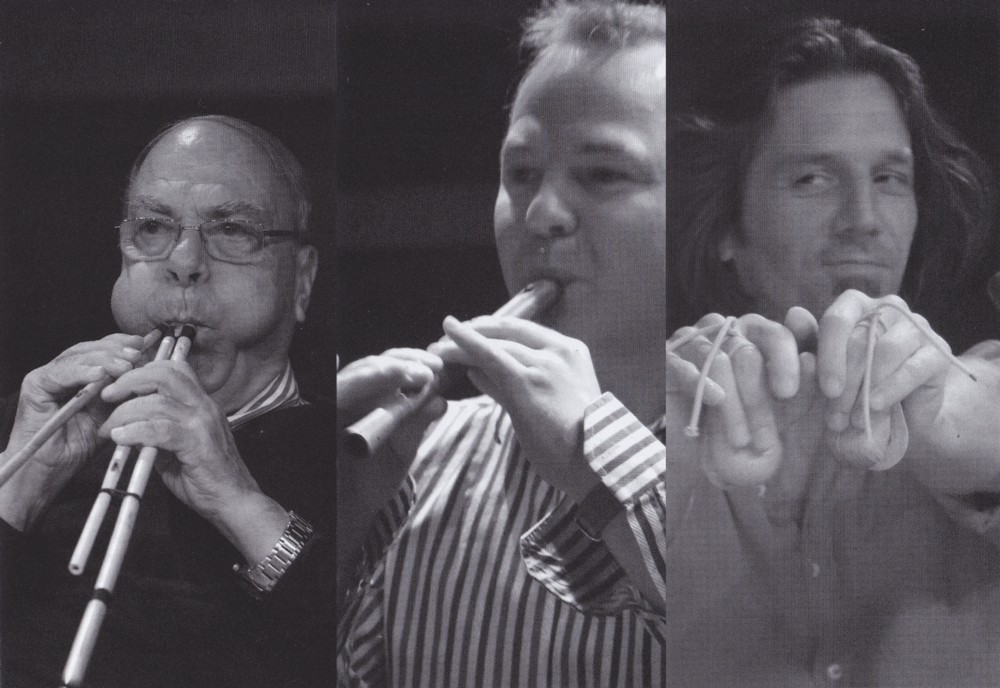
Luigi Lai
Luigi
Lai comes from Sardinia, where he is considered by many the greatest
living Lauddenas player. He studied with Antonio Lara and Efisio Melis,
and he continued to practice his art even when exiled to Switzerland for
fifteen years during his youth. Back in Sardinia, he has pursued a
career as a professional musician and worked among others with the
famous Italian songwriter Angelo Branduardi.
Michael Posch
Born
in Klagenfurt, Austria, he studied recorder at the Kärntner
Landeskonservatorium and the Conservatories of Vienna and Trossingen,
and took rnaster classes with Frans Brueggen and Walter van Hauwe. Since
1991 he has directed the ensemble Unicorn and performed throughout
Europe, in Canada, Taiwan, and the Middle East. He has also participated
in Baroque opera projects with Nikolaus Harnoncourt and interpreted
contemporary recorder music with the Österreichische Kammersymphoniker.
He leads the department of Early Music at Vienna Conservatory.
Peter Rabanser
Peter
Rabanser was born in Innsbruck, Austria. After studying classical
guitar he specialized in Eastern European, Turkish and Arabic plucked
and reed instruments and research into European and Oriental music
traditions. In 1983 he founded Oni Wytars with Marco Ambrosini.
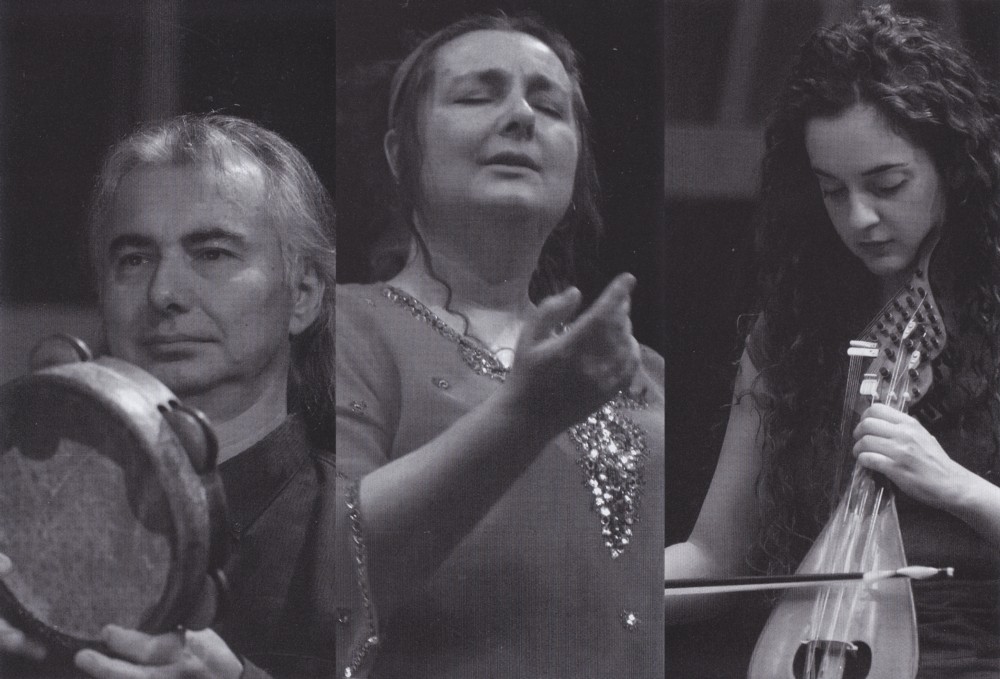
Carlo Rizzo
Carlo
Rizzo is an Italian percussionist, specializing in the tamburello, a
southern Italian form of the tambourine. Up to 1979 he studied painting
and sculpture in Rome, during which time he learned the tamburello with
Alfio Antico. In 1983 he toured as a musician in France, and went to
live there the following year. From 1991 to 1993 he taught Italian
traditional music at the University of Paris. Rizzo develops and builds
his own forms of tamburello.
Belinda Sykes
Born
in London, she studied oboe, recorder and baroque oboe at the Guildhall
School of Music, London. Travelling in Hungary, Bulgaria, Syria,
Jordan, Israel, Morocco and India she specialized in classical and
traditional singing styles and techniques of those countries. Belinda
directs the ensemble Joglaresa.
Kelly Thoma
Kelly
Thoma was born in Piraeus, Greece. In 1995 she started studying the
lyra with Ross Daly and three years later started travelling with him
and his group, "Labyrinth', participating in concerts in Europe, Asia,
Australia and the U.S. She has taken part in projects with musicians
from many different countries and traditions. Kelly studied English
literature at Athens University and is a graduate of the Rallou
Manou-Dance school.








